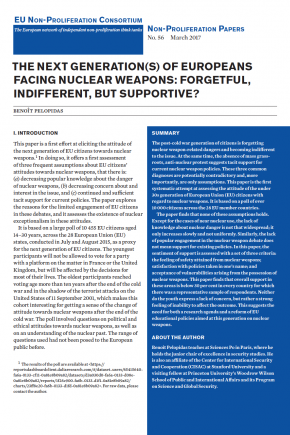The Next Generation(s) of Europeans Facing Nuclear Weapons: Forgetful, Indifferent, but Supportive?
The post-cold war generation of citizens is forgetting nuclear weapon-related dangers and becoming indifferent to the issue. At the same time, the absence of mass grassroots, anti-nuclear protest suggests tacit support for current nuclear weapon policies. These three common diagnoses are potentially contradictory and, more importantly, are only assumptions. This paper is the first systematic attempt at assessing the attitude of the under 30s generation of European Union (EU) citizens with regard to nuclear weapons. It is based on a poll of over 10 000 citizens across the 28 EU member countries.
The paper finds that none of these assumptions holds. Except for the cases of near nuclear use, the lack of knowledge about nuclear danger is not that widespread; it only increases slowly and not uniformly. Similarly, the lack of popular engagement in the nuclear weapon debate does not mean support for existing policies. In this paper, the sentiment of support is assessed with a set of three criteria: the feeling of safety attained from nuclear weapons; satisfaction with policies taken in one’s name; and acceptance of vulnerabilities arising from the possession of nuclear weapons. This paper finds that overall support in these areas is below 30 per cent in every country for which there was a representative sample of respondents. Neither do the youth express a lack of concern, but rather a strong feeling of inability to affect the outcome. This suggests the need for both a research agenda and a reform of EU educational policies aimed at this generation on nuclear weapons.

